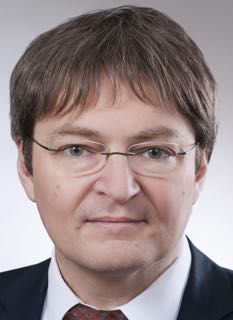Program
Program-at-a-Glance
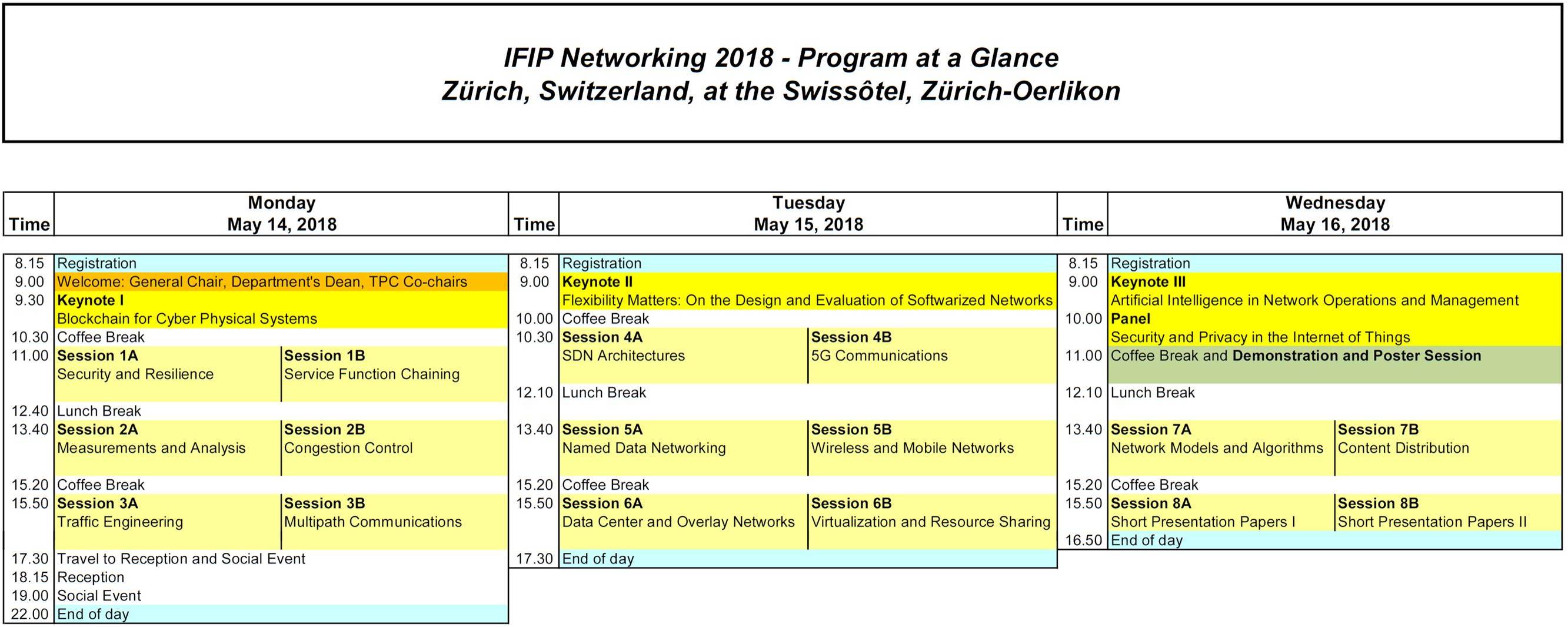
The Program-at-a-Glance is also available as PDF. Click here.
Program Booklet and Proceedings
The final IFIP Networking 2018 Program Booklet is available here.
The full Open Access IFIP Networking 2018 Proceedings are accessible for download at the IFIP Digital Library and have been submitted to IEEE Xplore for publication, too.
The full IFIP Networking 2018 Proceedings are available as a single PDF, too.
The three keynote's slide sets of IFIP Networking 2018 can be downloaded in PDF now: Keynote 1 [9.6 MB], Keynote 2 [7.2 MB], and Keynote 3 [3.1 MB].
Detailed Keynote Information
Keynote I
"Blockchain for Cyber Physical Systems"
Salil Kanhere, University of New South Wales, Sydney, Australia
More information will follow soonIn a Cyber Physical Systems (CPS), computing elements coordinate and communicate with sensors, which monitor cyber and physical indicators, and actuators, which modify the cyber and physical environment where they are run. Current CPS ecosystems rely on centralized, brokered communication models, otherwise known as the client-server paradigm. All devices are identified, authenticated, and connected through cloud servers. The data collected by devices is stored in the cloud for further processing. While this model has connected generic computing devices for decades and will continue to support small-scale CPS networks as we see them today, it will not be able to respond to the growing needs of the large-scale CPS ecosystems of tomorrow with billions of connected devices.
Cloud servers will remain a bottleneck and point of failure that can disrupt the entire network. This is especially important as critical services and infrastructure such as healthcare, electric grids, logistics, and transportation become dependent on CPS. The current stove-piped architecture has also created isolated data silos, where users have limited control over their data and how it is used. Users have to trust the cloud and application providers and have no choice but to rely on their promises of security and availability.
This keynote will explore how the Blockchain (BC) technology has the potential to overcome the aforementioned challenges. BC is an immutable timestamp ledger of blocks that is used for storing and sharing data in a distributed manner. The data stored might be payment history, e.g., Bitcoin, or a smart contract or even personal data. In recent years, BC has attracted tremendous attention from practitioners and academics in different disciplines (including law, finance, and computer science) due to its salient features, which include decentralization, immutability, auditability, security, and privacy. Thus, the talk will specifically consider three key aspects of CPSes: (i) Internet of Things, (ii) Intelligent Transportation, and (iii) Supply Chain and will explain relevant concepts, will review the state-of-the-art, will present representative solutions, and will discuss open challenges.
The keynote's slide set can be downloaded in PDF [9.6 MB] now.
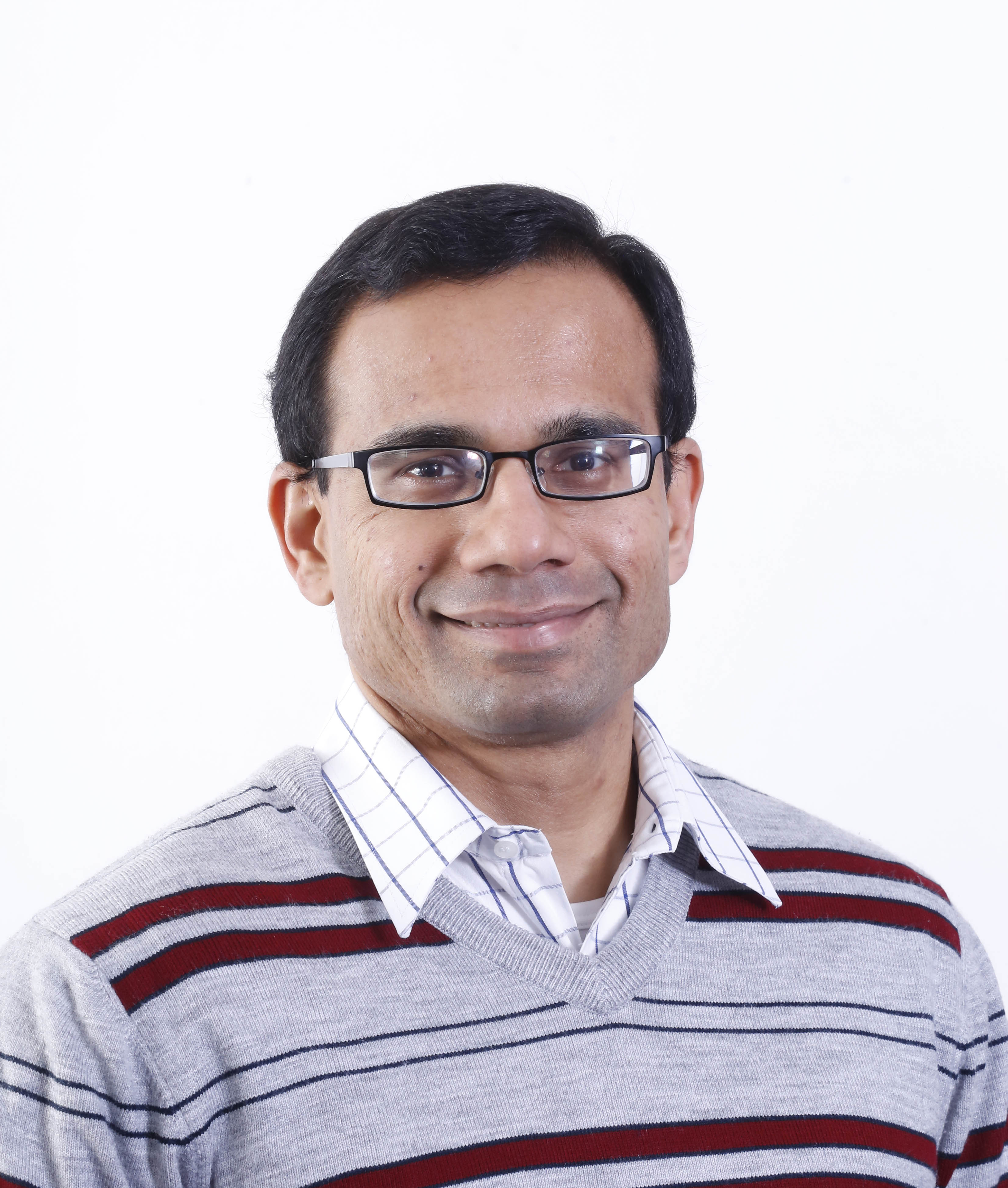 |
CV: Prof. Dr. Salil Kanhere received his M.S. and Ph.D. degrees, both in Electrical Engineering, from Drexel University, Philadelphia, U.S.A. He is an Associate Professor in the School of Computer Science and Engineering at UNSW Sydney, Australia. He is also a conjoint researcher at Data61 CSIRO, Faculty Associate at Institute of Infocomm Research Singapore, and on the advisory board of two technology start-ups. His research interests include Internet of Things, pervasive computing, blockchain, crowdsourcing, data analytics, privacy, and security. He has published over 180 peer-reviewed articles and delivered over 20 tutorials and keynote talks on these research topics. He has received 4 Best Paper Awards. His research has been featured on ABC News Australia, Forbes, Wired, ZDNET, MIT Technology Review, IEEE Spectrum and other media outlets. Salil serves on the Steering Committee of IEEE LCN and is the program co-chair for IEEE WoWMoM 2018 and ACM MSWiM 2018. He regularly features on the organizing committee of a number of IEEE and ACM international conferences. He is on the Editorial Board of Elsevier's Pervasive and Mobile Computing and Computer Communications and on the Executive Committee of the IEEE Computer Society's Technical Committee on Computer Communications (TCCC). Salil is a Senior Member of both the IEEE and the ACM. He is a recipient of the Alexander von Humboldt Research Fellowship. |
Keynote II
"Flexibility Matters: On the Design and Evaluation of Softwarized Networks"
Wolfgang Kellerer, Technical University of Munich (TUM), Germany
In order to address network dynamics and highly varying requirements, flexibility has emerged as a key property for networks to cope with increasing dynamics and to be prepared for future demands. Softwarized networks including concepts such as Network Virtualization, Software Defined Networking and Network Function Virtualization promise flexibility. However, so far flexibility is mainly used as a qualitative advantage for a certain design choice where the meaning of flexibility is varying a lot in literature. To provide a better understanding of how to design flexible networks, we propose a definition for flexibility and present an approach for a quantitative measure of flexibility in softwarized networks. In our proposal, we refer to flexibility as the ability to support new requests, e.g., changes in the requirements or new traffic distributions, in a timely manner. We illustrate with use case studies for function placement and SDN resilience, how this measure can be used to evaluate and compare different network designs quantitatively. To address adaptation time in flexible networks, we further present approaches to speed up the execution of algorithms based on machine learning. Examples include virtual network embedding and function placement. With our proposed approach for the definition and evaluation of flexibility, we intend to stimulate the discussion towards a more quantitative analysis of softwarized networks and beyond.
The keynote's slide set can be downloaded in PDF [7.2 MB] now.
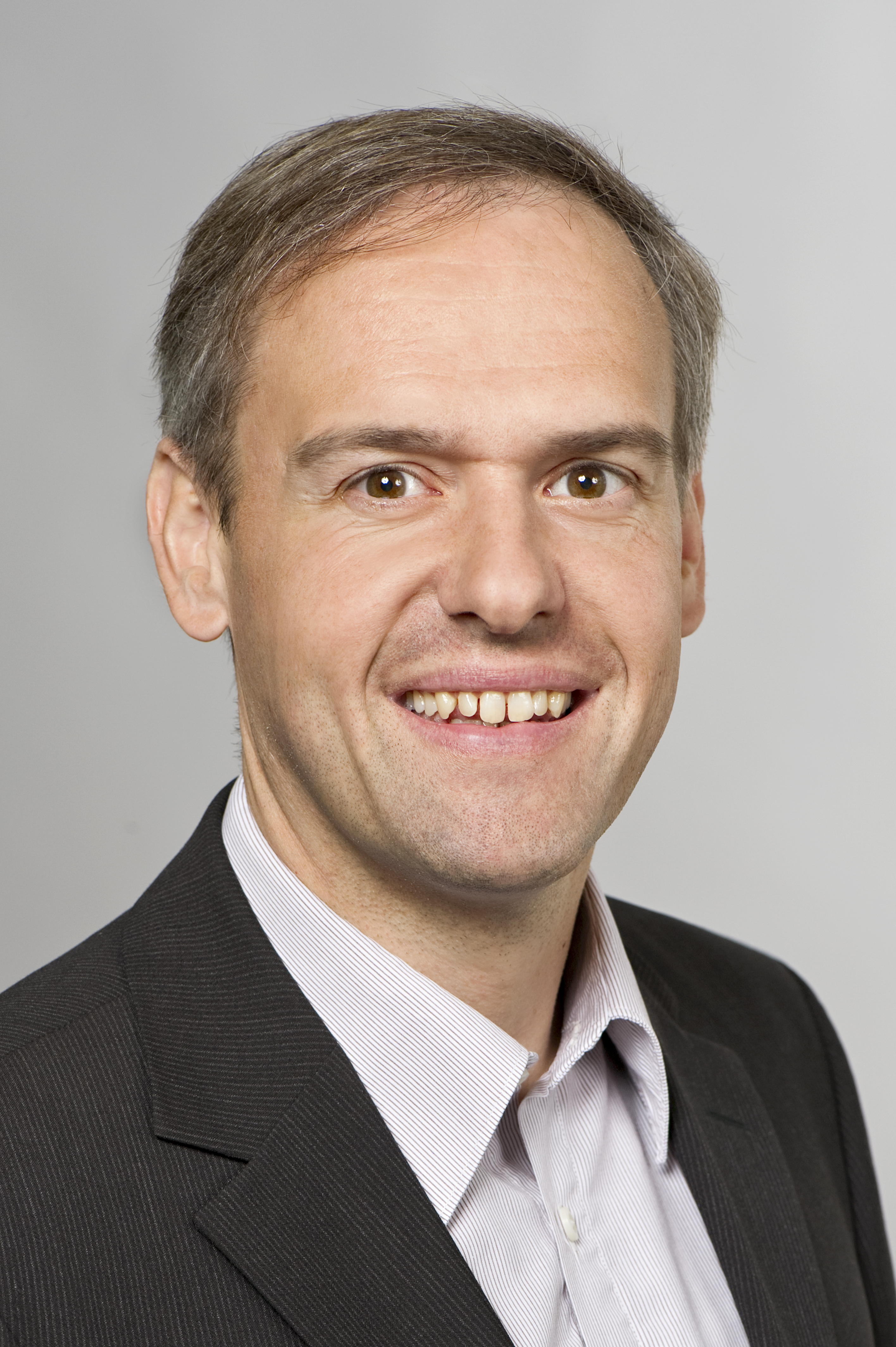 |
CV: Prof. Dr. Wolfgang Kellerer is a full professor with the Technical University of Munich (TUM), Germany, heading the Chair of Communication Networks at the Department of Electrical and Computer Engineering. Before, he was for over ten years with NTT DOCOMO's European Research Laboratories. His last position was head of the research department for wireless communication and mobile networking. His current research focuses on flexible networking based on SDN/NFV and wireless M2M networking towards 5G. He received his Dr.-Ing. degree (Ph.D.) and his Dipl.-Ing. degree (Master) from TUM, in 1995 and 2002, respectively. His research resulted in over 200 publications and 35 granted patents. In 2015, he has been awarded with a Consolidator Grant from the European Commission for his project FlexNets: "Quantifying Flexibility in Communication Networks". He is a member of ACM, VDE ITG, and a Senior Member of IEEE. |
Keynote III
"Artificial Intelligence in Network Operations and Management"
Jürgen Quittek, NEC Laboratories Europe, Germany
Complexity of communication networks and their management and operations is continuously growing. At the same time, the capabilities of Artificial Intelligence (AI) technologies, in particular of deep machine learning, are growing rapidly and offer a way to deal with the complexity.
This keynote gives a brief overview of the history of AI technologies and shows how recent advancements provide powerful means of analysis and prediction suited to address several of today's challenges in network operations and management. Several examples illustrate the variety of potential applications of AI to networking. The outlook will address upcoming technology trends, such as reinforcement learning, representation learning, and automated reasoning.
The keynote's slide set can be downloaded in PDF [3.1 MB] now.
|
|
CV: Dr. Jürgen Quittek is Managing Director of the NEC Laboratories Europe in Heidelberg, Germany. He received his degree in communications engineering from RWTH Aachen in 1989 and his Ph.D. from Hamburg University of Technology (TUHH) in 1996. After a postdoctoral year in Berkeley, California, he joined the NEC Laboratories in 1997. In 2000 he was a visiting professor at Freie Universität Berlin. He conducted research in the areas of neural networks, network management, data security, software-defined networking, energy-efficient communications, and 5G mobile networks, and he served as TCP chair and member of many conferences and workshops. As working group chair, rapporteur, and author he contributed to communication standards at ETSI, IETF, and ONF. His current research interests also include artificial intelligence and the Internet of Things (IoT). |
Panel
Security and Privacy in the Internet of Things
Panel Chair: James P.G. Sterbenz, The University of Kansas, U.S.A., and Lancaster University, U.K.
The Internet of Things (IoT) has become not only a hot topic for research, but as usual, is being deployed before we understand the implications of this technology, and without developed usability, security, privacy, resilience, survivability, controllability, accountability, and manageability.
This panel discusses whether IoT can or will be deployed with acceptable security and privacy for users and society, and whether lessons can be learned from the current ubiquitous mobile Internet. Are we racing towards a machine-assisted utopia or a machine-controlled dystopia?
Detailed Program
The full IFIP Networking 2018 program is also available as PDF. Click here.
Day 1 - Monday, May 14, 2018

Reception and Social Event
The reception and social event will be held at the Zürich Guild House named "Zunfthaus Zur Waag", Münsterhof 8, CH—8001 Zürich, Phone +41 44 216 99 66.
The "Zunfhaus zur Waag" offers a very stylish atmosphere of the old city of Zürich, while the building itself dates from 1315. It is facing directly the Fraumünster Church with its famous Chagall windows right at the Münsterhof.
Be in time for the IFIP Networking 2018 social event and enjoy the relaxing reception (a Swiss-style Apéro) before the dinner starts!
Reception: 18.15 hours, Social Event: 19.00 hours, End: 22.00 hours.
Day 2 - Tuesday, May 15, 2018
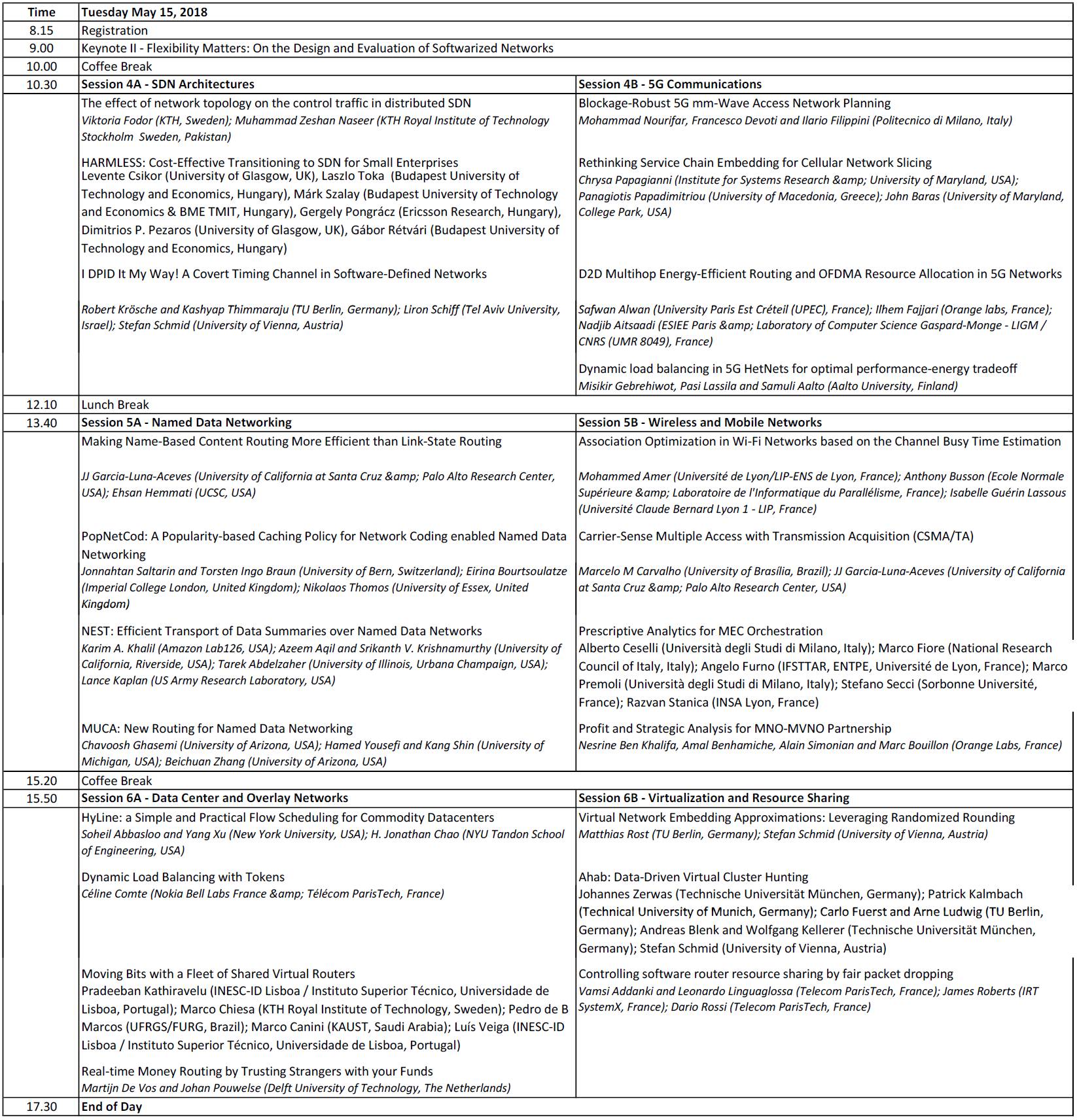
Day 3 - Wednesday, May 16, 2018
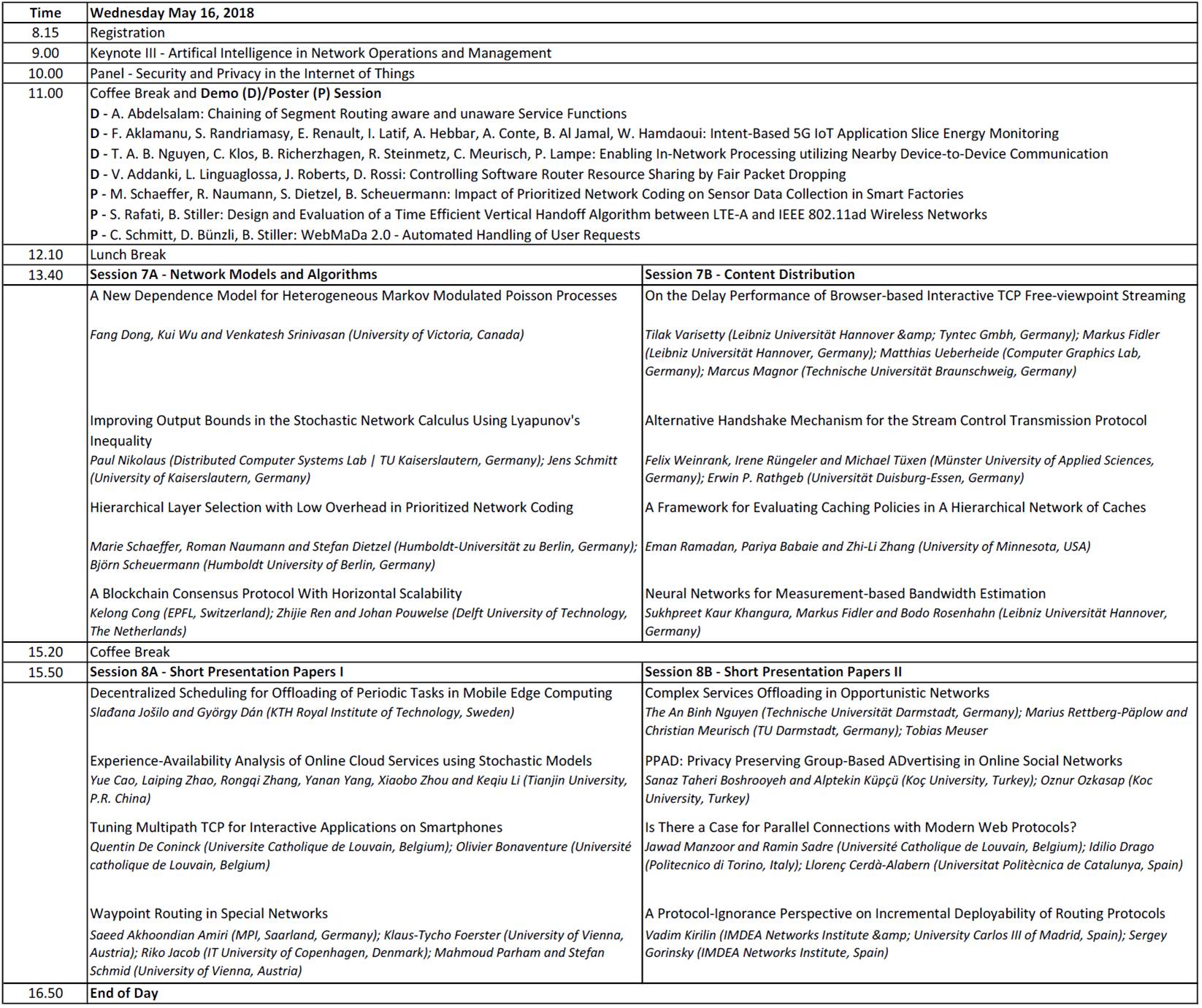
Demos and Posters
All demonstrations and posters are documented in two pages each. Thus, the full annex to the IFIP Networking 2018 proceedings, including all of these demonstrations and posters documents, are available here for download.
DEMOS
- A. Abdelsalam: "Chaining of Segment Routing aware and unaware Service Functions” (PDF)
- F. Aklamanu, S. Randriamasy, E. Renault, I. Latif, A. Hebbar, A. Conte, B. Al Jamal, W. Hamdaoui : "Intent-Based 5G IoT Application Slice Energy Monitoring” (PDF)
- T. A. B. Nguyen, C. Klos, B. Richerzhagen, R. Steinmetz, C. Meurisch, P. Lampe: "Enabling In-Network Processing utilizing Nearby Device-to-Device Communication” (PDF)
- V. Addanki, L. Linguaglossa, J. Roberts, D. Rossi: "Controlling software router resource sharing by fair packet dropping" (PDF)
POSTERS
- M. Schaeffer, R. Naumann, S. Dietzel, and B. Scheuermann: "Impact of Prioritized Network Coding on Sensor Data Collection in Smart Factories" (PDF)
- S. Rafati Niya, B. Stiller: "Design and Evaluation of a Time Efficient Vertical Handoff Algorithm between LTE-A and IEEE 802.11ad Wireless Networks" (PDF)
- C. Schmitt, D. Bünzli, B. Stiller: "WebMaDa 2.0 - Automated Handling of User Requests” (PDF)

